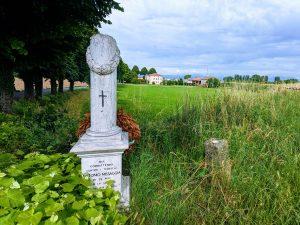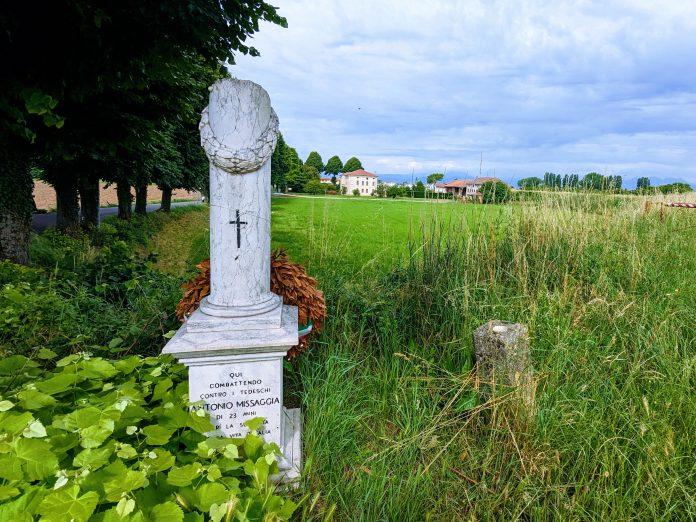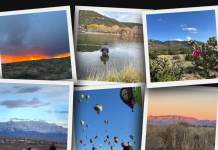In early 2022, as war erupted in Ukraine, I watched as many people who were closely connected to the military community purposefully distanced themselves from the news. They did not want to add to their worries by thinking about a war in Europe, and what that might mean for the service members they love. This was a reaction that I understood (sometimes life is just so full, and there is wisdom in holding boundaries), but did not share. In fact, I swung to an opposite extreme. I wanted to know exactly what was going on. I checked headlines daily. I poured over maps of the area, seeking to understand the current situation. I processed the news out loud with my husband and anyone else who was interested in joining the conversation. Why was I so obsessive about this? What made me want to know so many details? I am not a news junky by nature, and I do not follow every developing story this way. But the two words, “war” and “Europe” in the same sentence? This hit differently. Why?
Just a few years into our marriage, my husband and I had the opportunity to be stationed in Italy for the first time. Over the course of those three years, we soaked up Italian culture and traveled extensively throughout Europe. I got to visit countries I previously knew practically nothing about: Slovenia, Croatia, Czech Republic, Hungary. Every time we prepared to visit a new country or city, I would do a bit of research and learn something new. This helped me understand a bit more about the history of Europe, but it was walking the streets that brought it to life. Throughout my life I have learned and read about major historical events, such as the WWI, WWII, and the Cold War. But for those of us that grew up in the United States, these were all events that had happened far away. We were geographically separated by an entire ocean. Perhaps we heard stories from those who had witnessed war, but in Europe, I believe the experience is different.
practically nothing about: Slovenia, Croatia, Czech Republic, Hungary. Every time we prepared to visit a new country or city, I would do a bit of research and learn something new. This helped me understand a bit more about the history of Europe, but it was walking the streets that brought it to life. Throughout my life I have learned and read about major historical events, such as the WWI, WWII, and the Cold War. But for those of us that grew up in the United States, these were all events that had happened far away. We were geographically separated by an entire ocean. Perhaps we heard stories from those who had witnessed war, but in Europe, I believe the experience is different.
There is a saying that “water has memory” (if you have also watched the movie Frozen 2 a million times with your kids, you know what I’m talking about…). I would venture to add that land has memory too. It is true that there are few people still living who remember WWII. My generation is rather far removed from that period of history. But here in Europe, the very ground we are walking on holds the pain, struggle, and trauma of war. The buildings still carry scars. It seems that spending your life here makes it impossible to forget.
When we visited Croatia for the first time in 2016, we struck up a conversation with a gentleman on our tour bus. He was traveling from Denmark, and told us it was the first time he had returned to Croatia since the 1990’s, when he had been there as a U.N. Peacekeeper. He then pointed out nearby buildings that still had bullet holes from the Croatian War of Independence (1991-1995). I was floored. He was talking about a war that had happened within my own lifetime. As I spent time in Croatia and other countries in Eastern Europe, I began to look at their citizens through a new lens. Here were people that lived through the horrors of communist regimes, fought for their independence, and were here living their lives and welcoming visitors to enjoy the beauty that their homeland has to offer.
In the more Western parts of Europe, war is less recent, but no less prominent in the landscape. In Sicily, we saw Nazi bunkers sprinkled along the coast and railroads. In Northern Italy and Slovenia, we have encountered countless WWI monuments, cemeteries, and even portions of trench networks still intact along popular hiking trails. One of our vacation rentals in the capital of Slovenia had a plaque commemorating the moment when the communist party had gathered in the house prior to the start of WWII. The small Italian village where we currently live has its own memorial to those lost in the war, including a list of fourteen civilian victims, people who called this quiet village home. Around the corner, two small monuments mark the places where two young men “offered their life for the life of Italy.” The brutal consequences of hate and war were made painfully real to us when we visited the Dohány Street Synagogue in Budapest, a beautiful place of worship, which became the center of the city’s Jewish ghetto in 1944, when 70,000 Jewish people were forcibly relocated to the area. Over 2000 of them were buried next to the synagogue in mass graves after dying from cold and hunger. Perhaps one of the most dramatic displays of history and its ongoing effects that I have experienced in Europe, was encountered while visiting Normandy, France. Not only were we able to visit the beaches where the D-day invasion took place, but we also spent time in local towns, where there is still a sense of celebration and gratitude, all these decades later. American, British, and Canadian flags fly throughout the year. And celebrations, festivals, and memorial ceremonies are still held each and every year during the anniversary of the invasion in the tiny town of Sainte-Mère-Église, the first town to be liberated from Nazi occupation. The residents of these communities haven’t forgotten. Throughout Europe, the scars of war are still knit into the landscape, the streets, and the fabric of daily life in a myriad of ways.
Throughout history, war has often been glamorized. But of course there is nothing glamorous about it. I hate the idea of war. I am sure you do too. So why this newfound fascination with learning about it? The biggest thing that has changed for me as I have walked the streets where these events played out, is a greater understanding of the complexities of war. The question of whether a country should get involved in wars and conflicts is never black and white. Spending time in the places where wars took place during the last century brings to life just how widespread and all-consuming these atrocities were. My teenage self who romanticized the idea of sending a loved one off to battle and holding down the home front has faded away at this point – this is the last thing I want to experience. But at the same time, I am reminded how real the threat of war could become in any generation. The majority of people did not want war then, just like we do not want war now. But history reminds me of the importance of being prepared for the worst. Does this mean I have to follow the news nonstop looking for signs of trouble?? No. But for me, this deeper knowledge of history does allow me to understand and honor my spouse’s military service just a little bit better.











